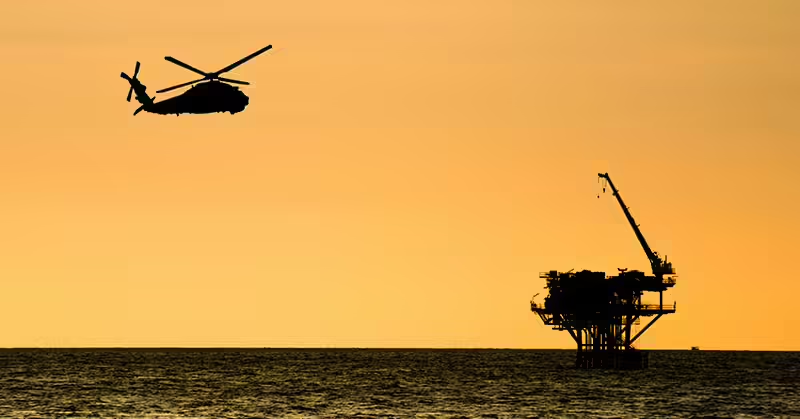I Was Injured While Being Transported Offshore—Can I Sue?
May 26, 2020

Offshore oil rigs are dangerous work environments. The chance of getting killed while working offshore in the oil and gas industry is “seven times higher than for all other workers in the United States.” For offshore drilling rig workers, just getting to work creates serious risks. A study of offshore injuries and fatalities found that getting to work is the most dangerous part of an offshore oil and gas worker’s job.
Offshore oil and gas workers are often transported to their worksites (i.e., the rig or platform) by helicopter. When a helicopter crashes at sea, it is not always clear which law or laws should apply. Different laws apply depending on various circumstances, including where the crash occurred, the purpose of the flight, and where the occupants were working.
Jones Act
If you are a sailor who is either flying or being flown to a ship, and your helicopter crashes, you might be able to sue your employer under the Jones Act for negligence, unseaworthiness, or because they did not have proper or adequate navigational or landing equipment installed on the helicopter.
Many pilots transporting sailors and supplies to and from ships may qualify as seamen under the Jones Act. A sailor under the Jones Act is someone employed by a vessel that operates in navigable waters and whose work contributes to the ship’s operation. You do not need to be on the vessel at the time of the accident to sue under the Jones Act. Recovery under the Jones Act is far-reaching, and you can sue for many things, including your pain and suffering, medical expenses, lost wages, and disfigurement.
Outer Continental Shelf Lands Act (OCSLA)
OCSLA applies to accidents occurring on a platform or rig engaged in activities related to exploring, developing, and producing resources on the outer continental shelf. OCSLA allows an injured person to sue their employer for negligence and also allows a deceased person’s family to recover compensation against the employer using the nearest state’s wrongful death statute. State wrongful death statutes can be broader than the Jones Act, allowing for damages such as compensation for the loss of the victim’s care, comfort, and affection.
Death On The High Seas Act (DOHSA)
DOHSA was enacted in the 19th century to allow “recovery of damages against a shipowner by a spouse, child or dependent family member of a seaman killed in international waters.” A lawsuit brought under DOHSA may be based on either a negligence claim or unseaworthiness. Recently, DOHSA has been used to provide recovery to the spouse, children, or dependent of people injured or killed aboard commercial flights that crash more than three nautical miles from the coast of the United States. DOHSA claims are limited to pecuniary damages only. That means that the claimants can only recover the financial contributions that the family member would have provided to the household, as well as the costs of the funeral. Under DOHSA, you cannot seek compensation for pain and suffering.
If you or a loved one has been injured or killed while being transported to a rig or platform, please contact the offshore injury lawyers at Morrow & Sheppard LLP for a free consultation.
Daniel Sheppard is licensed to practice personal injury law in Texas and Louisiana. Daniel takes pride in providing exceptional service to clients who were seriously hurt on the job and brings his relentless work ethic into the office and the courtroom. Learn more about Daniel.
- Home
- |
- Maritime Injuries
- |
- I Was Injured While Being...
















































